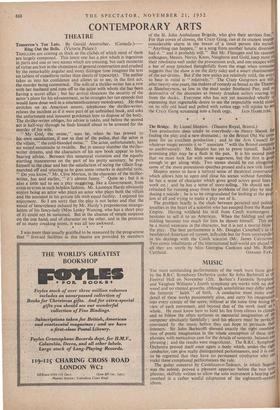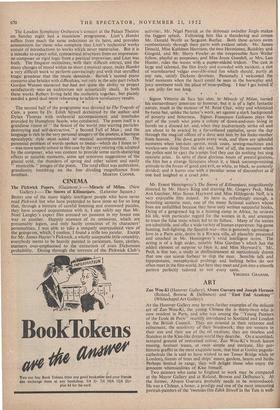MUSIC
THE most outstanding performances of the week were those gi‘eli by the B.B.C. Symphony Orchestra under Sir John Barbirolli at 1.10 Festival Hall on November 12th. Berlioz's Fantastic Symphotfli and Vaughan Williams's fourth symphony are works with no dead wood and no stunted growths, although sensibilities may differ.aboot the fantastic " habit " of both. A conductor must make evol detail of these works passionately alive, and carry his imagination into every cranny of the score, without at the same time losing his view of each movement, and beyond that of the work itself as 3 whole. He must know how to hold his fire from climax to climOi and to follow the often tortuous or mercurial imagination of the composer absolutely .faithfully ; and his players must be perfectly convinced by the music, before they can hope to persuade their listeners. Sir John Barbirolli shOwed exactly the right combinr lion of poetic imagination in the whole conception of these synr phonies, with meticulous care for the details of sonority, balance and phrasing ; and the results were magnificent. The B.B.C. Symphony Orchestra proved itself once again a body which, under the right conductor, can give really distinguished performances, and it is only to be regretted that they have no permanent conductor who can make these exceptional perforMances the rule. The guitar concerto by Castelnuovo-Tedesco, in which Segovis was the soloist, proved a .pleasant appetiser before the two Val' phonies, skilfully written to allow the solo instrument a hearing and couched in a rather wistful adaptation of the eighteenth-century idiom. The London Symphony Orchestra's concert at the Palace Theatre on Sunday night had a musicians' programme; Liszt's Hamlet suffers from much the same indecision as its hero, and provides ammunition for those who complain that Liszt's orchestral works consist of introductions to works which never materialise. But it is a mistake to expect solid, symmetrical structures from an impression- ist composer or rigid logic from a poetical improviser, and Liszt was both. The frequent recitatives, with their difficult entries, and the• many changes of mood within so short a musical space, make Hamlet• a very difficult work to perform convincingly and with that unruffled tragic grandeur. that the music demands. Bartok 's second piano concerto also bristles-with d;fficulties,'not only in the solo part (which Gordon Watson mastered but had not quite- the ability to project satisfactorily into an auditorium not acoustically ideal). In both these works Robert Irving held the.orchestra together, but plainly needed a good deal more rehearsing to achieve satisfactory results.
* *
The second half of the programme was devoted to The Tragedy of Cain, a poem by Dr. Edith Sitwell declaimed by the author and Dylan 'Thomas with orchestral accompaniment and interludes provided by Humphrey Searle, who conducted. The poem itself is a grandiose vision of " the fission of the world into warring particles destroying and self-destructive," a Second Fall of Man ; and the language is rich in the very personal imagery of the poetess, a baroque apocalyptic style most suited to musical ' accompaniment. The perennial problem of words spoken to music—which do I listen to ? —was more nearly solved in this case by the very retiring role adopted by the composer, who was content to provide some earth-shattering effects at suitable moments, some apt sonorous suggestions of the glacial cold, the thunders of spring and other salient and easily
musicable " images of the poem. The total effect was ambivalent, grandiosity trembling on the line dividing magnificence from











































































 Previous page
Previous page